
Skippers are a group of butterflies placed in the family Hesperiidae within the order Lepidoptera. They were previously placed in a separate superfamily, Hesperioidea; however, the most recent taxonomy places the family in the superfamily Papilionoidea, the butterflies. They are named for their quick, darting flight habits. Most have their antenna tips modified into narrow, hook-like projections. Moreover, skippers mostly have an absence of wing-coupling structure available in most moths. More than 3500 species of skippers are recognized, and they occur worldwide, but with the greatest diversity in the Neotropical regions of Central and South America.
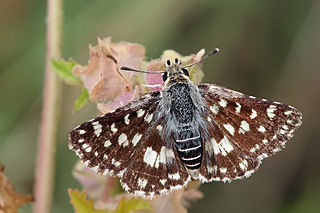
Pyrginae, commonly known as spread-winged skippers, are a subfamily of the skipper butterfly family (Hesperiidae). The subfamily was established by Hermann Burmeister in 1878. Their delimitation and internal systematics has changed considerably in recent years with the most recent review being in 2019.

Pyrgus is a genus in the skippers butterfly family, Hesperiidae, known as the grizzled skippers. The name "checkered" or "chequered skipper" may also be applied to some species, but also refers to species in the genera Burnsius and Carterocephalus. They occur in the Holarctic with an additional group of species extending to the Neotropic.

The Hesperiini or branded grass skippers are a tribe in the Hesperiinae subfamily of skipper butterflies. They are known as branded grass skippers because all the males in this tribe feature a black diagonal brand of scales on their forewings that exude pheromones to attract females.
The Astictopterini are a tribe in the Hesperiinae subfamily of skipper butterflies. As most Hesperiinae have not yet been assigned to tribes, more genera may be placed here eventually.

The Eudaminae are a subfamily of skipper butterflies. Their original type genus Eudamus is today a junior synonym of Urbanus. They are largely found in the Neotropics, with some extending into temperate North America, and one genus, Lobocla, endemic to East Asia.

Epargyreus is the genus of flasher butterflies, in the subfamily Eudaminae of skipper butterflies. The species are found in the Nearctic and Neotropical realms.

Urbanus is a genus of skipper butterflies erected by Jacob Hübner in 1807, placed to subtribe Eudamina. Species of the genus are found from the southern United States to South America.

The Celaenorrhinini are a tribe of spread-winged skippers in the skipper butterfly subfamily Tagiadinae.
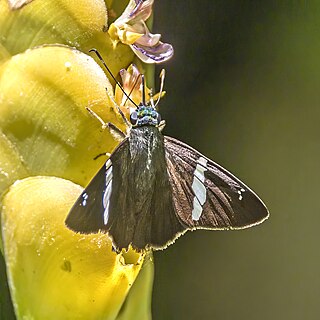
Autochton is a genus of skipper butterflies. They belong to the subfamily Eudaminae, which was long included with the spread-winged skippers (Pyrginae) as a tribe. They are found from Mexico to South America.

The giant skippers (Megathymini) are a tribe of butterflies in the family Hesperiidae.
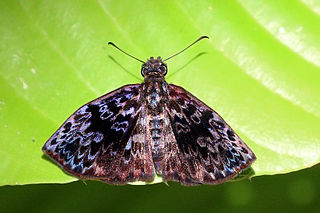
Cycloglypha is a genus of skippers in the family Hesperiidae.

Dyscophellus is a genus of largely Neotropical butterflies in the family Hesperiidae. The genus has been the subject of recent revisions based on genome analysis. It is currently placed in tribe Phocidini within the subfamily Eudaminae.
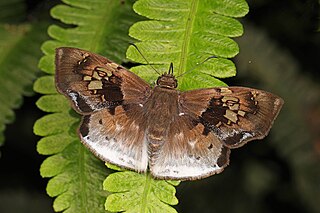
Gindanes is a genus of skippers in the family Hesperiidae.
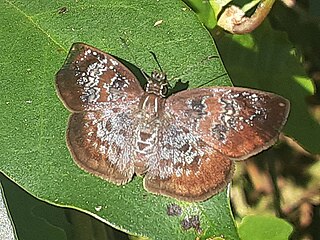
Sostrata is a genus of skippers in the family Hesperiidae.

Telemiades is a genus of Neotropical butterflies in the family Hesperiidae.
Typhedanus is a genus of Neotropical butterflies in the family Hesperiidae (Eudaminae).
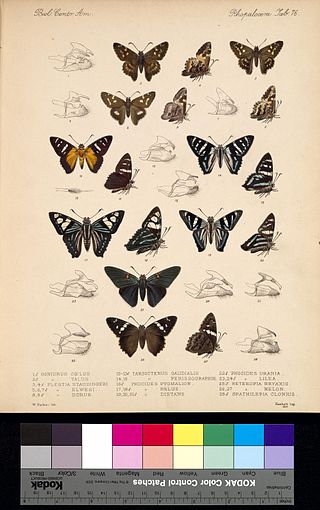
Zestusa is a genus of skippers in the family Hesperiidae subfamily Eudaminae. Species of the genus occur in Mexico and the western United States.

The Carcharodini are a tribe in the skipper butterfly subfamily Pyrginae. They are a very diverse but quite plesiomorphic and inconspicuous group distributed throughout the tropics.

Moncina is a subtribe of butterflies in the skipper subfamily Hesperiinae.



















